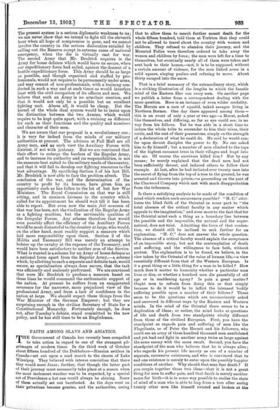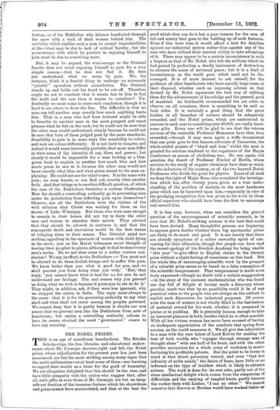FAITH AMONG SLAVS AND ASIATICS. T HE Government of Canada has
recently been compelled to take action in regard to one of the strangest pil- grimages of modern times. In the third week of October about fifteen hundred of the Dukhobors—Russian settlers in Cknada—set out upon a mad march to the shores of Lake Winnipeg. They believed with intense conviction that there they would meet Jesus; further, that though the latter part of their journey must necessarily take place at a season when the most inclement weather was to be expected, by a special act of Providence a hot sun would always be shining. Some of them actually set out barefooted. As the days went on their privations became greater, and the authorities, seeing that to allow them to march further meant death for the whole fifteen hundred, told them at Yorkton that they could not be allowed to travel about the country with women and children. They refused to abandon their journey, and the Mounted Police were therefore ordered to take away the women and children by force; the men were left for a time to themselves, but eventually nearly all of them were taken and sent back to their homes,—not, it is to be supposed, without a certain amount of violence, for the men linked arms in a solid square, singing psalms and refusing to move. • About thirty escaped into the snow.
That is a brief summary of the extraordinary story, which is a striking illustration of the lengths to which the fanatic mind of the Eastern Slav can carry men. On another page we publish a letter from a correspondent dealing with the same question. Here is an instance of even wilder credulity. The Murata are a race of squalid, naked savages living in Northern Borneo. One day there appeared among them— this is an event of only a year or two ago—a Murat, paled like themselves, and differing, so far as eye could see, in no way from his fellows. Yet he was able in a short time to induce the whole tribe to surrender to him their wives, their cattle, and the rest of their possessions, simply on the strength of a declaration of what he could do. He said be would con- fer upon devout disciples the power to fly. No one asked him to fly himself ; but a number of men climbed to the tops of the highest cocoanut trees in their villages and leapt into the air. Of course the survivors killed him ? Not by any means; he merely explained that the dead men had not been sufficiently devout, and induced others to follow their example. At last, after he had initiated over twenty men into the secret of flying from the top of a tree to the ground, he was arrested and thrown into prison,—a proceeding on the part of the Chartered Company which met with much disapprobation from the tribesmen.
Is there a satisfying analysis to be made of the condition of mind which renders such occurrences possible ? "H. C." attri• butes the blind faith of the Oriental. in some part to "the total absence of the critical faculty in any matter which appeals to the imagination," and even more to the fact that for the Oriental mind such a thing as a boundary line between the possible and the impossible, the natural and the super- natural, does not exist. Admitting the force of that conten- tion, we should still be inclined to seek further for an explanation. "H. C." does not answer the whole question. The absence of a critical faculty would explain the acceptance of an impossible story, but not the contemplation of death and suffering, and the willingness to face both, without protest. The explanation is to be found, we believe, in the view taken by the Oriental of the value of human life,—a view essentially different from that of the Western European. Is it a great thing or a little thing for a man to be killed ? How much does it matter to humanity whether a particular man lives or dies, or whether a hundred men die peacefully of old age or in maddening agony? Is pain a great matter? Ought men to refrain from doing this or that simply because to do it would be to inflict the intensest bodily suffering possible upon a number of their fellows ? Those seem to be the questions which are unconsciously asked and answered in different ways by the Eastern and Western minds. In the mind of the Oriental there seems to be a duplication of ideas ; or rather, the mind looks at questions of life and death from two standpoints wholly different from those of the civilised European. First, you have the standpoint as regards pain and suffering of men like the Flagellants, or of Peter the Hermit and his followers, who could see an army of three hundred thousand men annihilated and yet lead and fight in another army twice as large against the same enemy with the same result. Second, you have the standpoint of the man who believes that be is always alive ; who regards his present life merely as one of a number of separate, successive existences, and who is convinced that to end one exiatence is merely to enter upon the possibly happier conditions of another. Why should that man fear death ? If you couple together those two ideas—that it is not a great thing for men to suffer pain, and that death is merely another name for birth—it is in some way possible to realise the state of mind of a man who is able to leap from a tree after seeing twenty other men like himself twisted and broken at the
bottom, or of the Dukhobor who labours barefooted through the snow with a trail of dead women behind him. The credulity which enables such a man to accept improbabilities at the outset may be due to lack of critical faculty ; but the perseverance with which he persists in exposing himself to pain must be due to something more.
But, it may be argued, the semi-savage or the Oriental fanatic does not mind exposing himself to pain for a very simple reason,—that he does not feel it. He does not understand what we mean by pain. We, for instance, think it a fearful thing to undergo an extremely "painful" operation without anaesthetics. The Oriental stands up and holds out his hand to be cut off. Therefore ought we not to conclude that it means less to him to feel the knife and the saw than it means to ourselves? 'Un- doubtedly we must come to some such conclusion, though it is hard to see where to draw the line. The difficulty is that no man can tell another man exactly how much anything hurts him. That is, a man who had been tortured might be able to describe to another man in the most pungent and exact phrases what he felt on the rack, but he could not be sure that the other man would understand, simply because he could not be sure that both of them judged pain by the same standards. Sensibility to pain is in some ways like sensibility to colour, and men see colour differently. It is not hard to imagine, and indeed it would seem inherently probable, that most men differ in their sense of the intensity of, say, blues and greens; but clearly it would be impossible for a man looking at a blue- green book to explain to another how much blue and how much green he saw in it, because the other man would not know exactly what blue and what green meant to the man ex- plaining. He could not use the other's eyes. It is the same with pain ; no man knows, or can find out, exactly what another feels. And that brings us to another difficult question, of which the case of the Dukhobors furnishes a curious illustration. How far should a controlling authority go in preventing men under its jurisdiction from inflicting pain upon themselves ? Observe, not all the Dukhobors were the victims of the wild delusion that Christ was waiting for them on the shores of Lake Winnipeg. But those who were sane enough to remain in their homes did not try to force the other men and women to abandon their march. They advised that they should be allowed to continue it, and that the consequent death and starvation would be the best means of bringing them to their senses. The Oriental mind saw nothing appalling in the spectacle of women with child dying in the snow; just as the Murut tribesmen never thought of tearing their prophet to pieces, although he had broken twenty men's necks. Do we not then come to a rather curious con-
clusion? We say, in effect, to the Dukhobors You must not be allowed to do these foolish things and to suffer this pain. We know better than you what is good for you, and we shall prevent you from doing what you wish." But,' they reply, 'you cannot know what is best for U3, for you do not understand our feelings. The real reason why you prevent us doing what we wish is because it pains you to see us do it.' They might, in addition, ask, if they were less ignorant, why we stopped the suttee in India. The reply must always be the same : that it is for the governing authority to say what shall and what shall not occur among the peoples governed. We cannot deny that it is partly because it shocks our own senses that we prevent men like the Dukhobors from acts of fanaticism ; but unless a controlling authority refuses to have its senses shocked the word " government " ceases to have any meaning.



















































 Previous page
Previous page